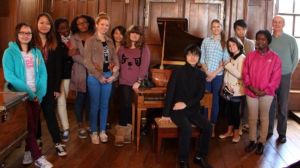 A group of talented pianists, led by our Director of Music, Mr Stubberfield, visited Finchcocks to try out the instruments. Finchcocks museum, between Goudhurst and Lamberhurst, has a very large collection of historic keyboards, allowing students to play their pieces on the instruments for which they were intended.
A group of talented pianists, led by our Director of Music, Mr Stubberfield, visited Finchcocks to try out the instruments. Finchcocks museum, between Goudhurst and Lamberhurst, has a very large collection of historic keyboards, allowing students to play their pieces on the instruments for which they were intended.
There we met Steven Devine, who was giving a concert at Finchcocks that afternoon. He demonstrated several of the keyboards in the collection to us, from the earliest harpsichords, through the delicate and intimate sound of the clavichord, to the beautifully toned fortepianos and the more robust cousin, the pianoforte.
This last type is the direct ancestor of our modern piano. Steven finished his introduction playing the famous “Turkish Rondo” by Mozart on a late Viennese fortepiano. Those of you who have been to the museum will know exactly how this sounds – those of you who haven’t, then go expecting a unique surprise!
After that, it was the students’ turn. Armed with pieces from the English and European late baroque and the classical Viennese School, our pianists immediately discovered the clarity that these instruments produce, making sense of the original music. Alvin, seen here playing a harpsichord, found a new sense of phrasing and articulation was apparent as he played his piece. Jeannie found a piano from the same date as the Beethoven sonata she had been playing, made by Conrad Graf. She instantly fell in love with the instrument, wondering if a modern piano could be adjusted to have such a light and crisp bass register.
Steven was astonished at how heavy the action was on Chopin’s favourite piano, made by Pleyel. In the end, Steven found it easier to play the “black key” etude on the Erard piano from about the same date.
Many students had a favourite instrument, some preferring the small “square” pianos, others the big sound of the later instruments. Georgia discovered her favourite, a house organ with eight stops, made a good loud sound that could be heard in several of the rooms! Mr Stubberfield, however, once prized away from the harpsichords, found a harmonium that was made shortly before Rossini’s death.
All the way home he could be heard humming tunes from Rossini’s Petit Messe Solennelle.
We’re looking forward to a return visit, thus allowing our students to explore some more. If you’re interested and can’t wait for us to go, then do contact Finchcocks directly on 01580 211702 to find out about the tours and events there.